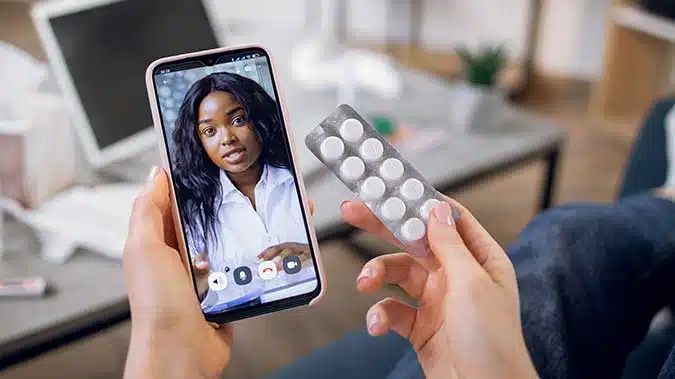Telemedicine Medication-Assisted Treatment (Tele-MAT) | Pros & Cons
- What Is Telemedicine MAT?
- How Tele-MAT Works
- Pros Of Telemedicine MAT
- Cons Of Telemedicine MAT
- Is Tele-MAT Right For You?

Medication-assisted treatment (MAT) has been proven as a highly effective treatment for both opioid use disorder (also called opioid addiction) and alcohol use disorder (alcohol addiction). MAT involves the use of medications to ease drug cravings and withdrawal symptoms.
Most MAT programs require you to visit a treatment facility on either an inpatient or outpatient basis. However, in recent years, many people have started using online MAT. This treatment option has unique advantages and disadvantages.
What Is Telemedicine Medication-Assisted Treatment (Tele-MAT)?
Online MAT, also called virtual MAT, is a form of telemedicine. Telemedicine refers to the use of telecommunications technology, such as video chats and phone calls, to diagnose and treat health conditions.
How Tele-MAT Works
Not all online MAT programs are the same. However, most of them follow a general format. First, you will have a consultation with an enrollment coordinator. This person will gather information about your addiction, overall health, and treatment goals.
Next, you will have your first appointment with your MAT provider. The appointment will occur via phone, video chat, or online chat. Your provider will work with you to create a personalized treatment plan that meets your needs.
The plan will likely include medications as well as behavioral therapy. It may also address any co-occurring mental health conditions you have.
After your first appointment, your treatment provider will electronically send your prescription to your local pharmacy. You will continue to meet with your provider at weekly, biweekly, or monthly telemedicine appointments.
At each appointment, your provider will discuss your progress and, if necessary, refill your prescription.
What Medications Are Used In Tele-MAT?
The United States Food and Drug Administration (FDA) has approved the following drugs for use in MAT for opioid use disorder:
- buprenorphine, which reduces opioid cravings
- methadone, which reduces opioid cravings and withdrawal symptoms
- naltrexone, which blocks the pleasant effects of opioids
- Suboxone, which is a combination medication that consists of buprenorphine, which reduces opioid cravings, and naloxone, which blocks the effects of opioids
The FDA has approved the following drugs for use in MAT for alcohol use disorder:
- acamprosate, which reduces alcohol cravings
- disulfiram, which discourages alcohol use by causing unpleasant symptoms like nausea and headache when you drink alcohol
- naltrexone, which blocks the pleasant effects of opioids
Pros Of Telemedicine MAT
Like traditional MAT, virtual MAT has been proven to help people achieve long-term recovery from opioid and alcohol addictions. In particular, it has been shown to:
- make your withdrawal process safer and easier
- reduce your risk of drug overdose death
- reduce your risk of poor birth outcomes if pregnant
- reduce your risk of contracting HIV or hepatitis C
- increase your ability to find and keep a job
Convenience
Virtual MAT also offers convenience. Many people who seek traditional MAT can’t find programs in their areas. Instead of traveling to a program in another city, they can now use virtual MAT.
This option not only saves money but also time. You can use that extra time to engage in other addiction treatment services, such as mental health counseling and support groups. In general, the more treatment services you use, the lower your risk of relapse.
The convenience of virtual MAT also allows you to keep up with your responsibilities at work and home. That means it’s much more accessible than traditional MAT, especially if you can’t afford to take time off from work or can’t find childcare.
Cons Of Telemedicine MAT
In inpatient MAT, doctors supervise patients 24/7, and in outpatient MAT, doctors regularly meet with patients in person.
In contrast, virtual MAT does not provide any supervision or physical interaction.
That means patients may be more likely to abuse their medications. For example, they might take higher doses than prescribed or mix their medications with other drugs. This behavior poses serious health risks, including overdose.
In addition, if you experience side effects from any of your medications, you won’t receive the immediate medical attention you’d get in an inpatient MAT program.
Finally, like traditional MAT, virtual MAT can be expensive. You may struggle to afford it if you are uninsured or underinsured.
Is Tele-MAT Right For You?
Like other substance abuse treatment programs, virtual MAT is not right for everyone. If you have a severe addiction, you may want to choose a traditional MAT program since it offers more supervision.
However, if you live too far from a traditional MAT program or want more flexibility, virtual MAT can be an effective alternative.
To learn more about MAT and other addiction recovery services, please contact an Ark Behavioral Health specialist. Our behavioral health care providers offer a variety of inpatient and outpatient treatments, including mental health counseling, medical detox, and aftercare planning.
Written by Ark Behavioral Health Editorial Team
©2024 Ark National Holdings, LLC. | All Rights Reserved.
This page does not provide medical advice.
Substance Abuse and Mental Health Services Administration - Medication-Assisted Treatment (MAT)
Substance Abuse and Mental Health Services Administration - MAT Medications, Counseling, and Related Conditions
United States Food and Drug Administration - Information about Medication-Assisted Treatment (MAT)

Questions About Treatment?
Ark Behavioral Health offers 100% confidential substance abuse assessment and treatment placement tailored to your individual needs. Achieve long-term recovery.
100% confidential. We respect your privacy.
Prefer Texting?
Our friendly support team is here to chat 24/7. Opt out any time.

People Also Read
- Opioid Drugs & Addiction
- Opioid Addiction Treatment Options
- Alcohol Addiction
- Medications Used For AUD
- Alcohol Withdrawal Symptoms
- Medications Used For Alcohol Withdrawal
- Challenges Of Buprenorphine Treatment & Fentanyl
- Alcohol Addiction Treatment
- Find A Suboxone Clinic Near You
- What Is Opioid Pseudoaddiction?






 Learn More
Learn More








